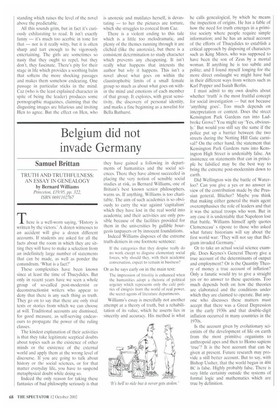Belgium did not invade Germany
Samuel Brittan
TRUTH AND TRUTHFULNESS: AN ESSAY IN GENEALOGY by Bernard Williams Princeton, £19.95, pp. 322, ISBN 06911027157 There is a well-worn saying, 'History is written by the victors.' A dozen witnesses to an accident will give a dozen different accounts. If students are asked for all the facts about the room in which they are sitting they will have to make a selection from an indefinitely large number of statements that can be made, as well as ponder the conundrum. 'What is a fact?'
These complexities have been known since at least the time of Thucydides. But only in recent years have we seen a whole group of so-called post-modernist or deconstructionist writers who appear to deny that there is any such thing as truth. They go on to say that there are only rival texts or stories from which we can choose at will. Traditional accounts are dismissed, for good measure, as self-serving endeavours to propagate the power of the ruling classes.
The kindest explanation of their activities is that they take legitimate sceptical doubts about topics such as the existence of other minds or the existence of the external world and apply them at the wrong level of discourse. If you are going to talk about history or the social sciences, or for that matter everyday life, you have to suspend metaphysical doubt while doing so.
Indeed the only reason for taking these fantasies of bad philosophy seriously is that they have gained a following in departments of humanities and the social sciences. There they have almost succeeded in placing the very notion of sensible social studies at risk, as Bernard Williams, one of Britain's best known senior philosophers, warns us. If anything, Williams is too charitable. The aim of such academics is so obviously to carry the war against 'capitalism' which they have lost in the real world into academia; and their activities are only possible because of the facilities provided for them in the universities by gullible bourgeois taxpayers or by innocent foundations.
Indeed Williams disposes of the extreme truth-deniers in one footnote sentence:
the categories that they despise really do no work except to disguise elementary social forces, why should they, with their academic conversation, expect to remain in business?
Or as he says early on in the main text:
The impression of frivolity is enhanced when the humanities adopt a rhetoric of political urgency which represents only the cafe politics of emigres from the world of real power, the secret agents of literature departments.
Williams's essay is mercifully not another attempt at a theory of truth, but a rehabilitation of its value, which he asserts lies in sincerity and accuracy. His method is what


































































































 Previous page
Previous page